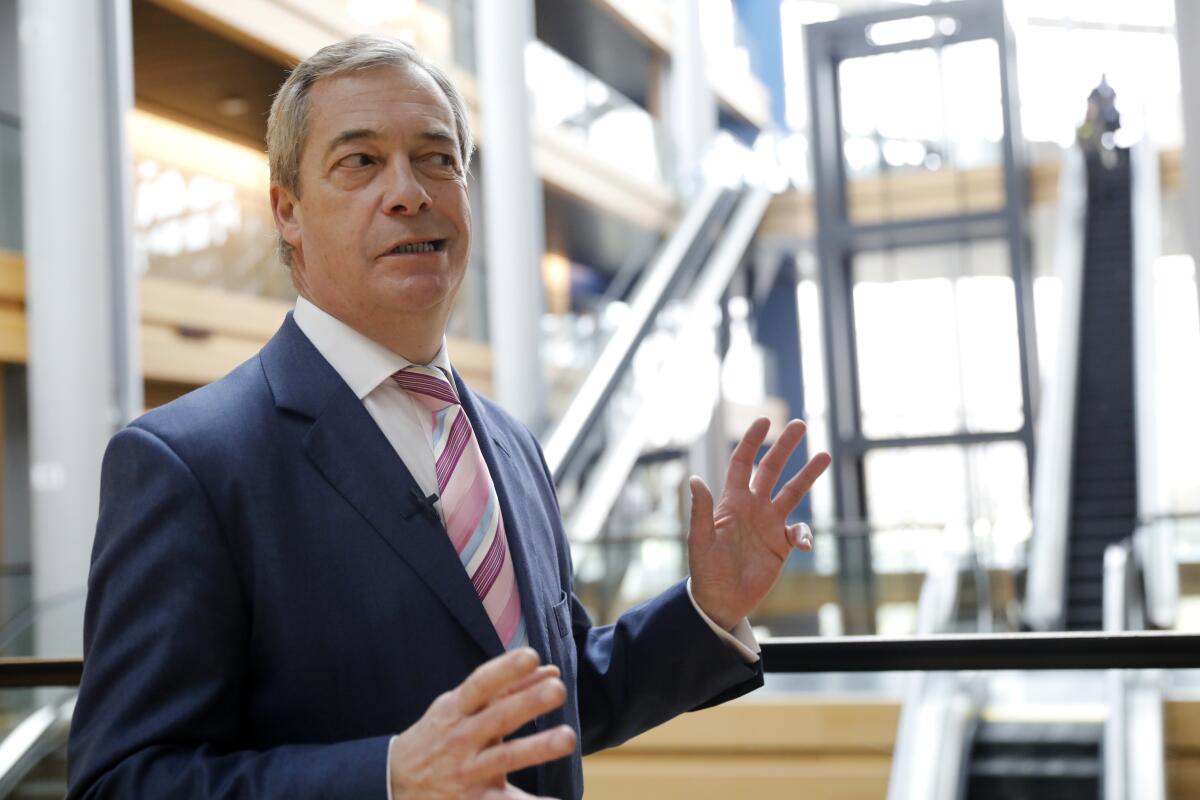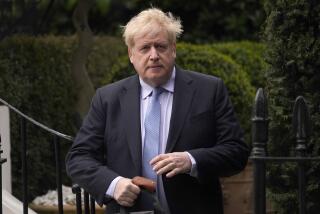Nigel Farage gets his way, and last laugh: Brexit is coming

- Share via
STRASBOURG, France — Nigel Farage, the self-declared “pantomime villain” of Brexit, is leaving his favorite theater — the European Union’s parliament in Strasbourg — this week with a sense of mission accomplished.
Ridiculed for years, and thriving on the abuse he got from, and dealt to, pro-EU legislators and politicians, he now feels he got the last laugh. On Jan. 31, Britain will be leaving the EU, in a historic loss for the bloc — and a historic gain for the likes of Farage.
“When I first came here, I started saying the U.K. would leave the European Union. Everyone thought it was hilarious,” Farage told the Associated Press in an interview, speaking about his early days in the EU legislature in the late 1990s.
The European Union was still thriving, expanding at the time, and could shrug off a loud and sometimes foulmouthed legislator from Britain as just a nuisance about to be swatted aside by the force of history of closer integration.
Britain may have been a halfhearted member with rumbling about holding on to sovereignty and complaints about “unelected bureaucrats” from Brussels having too much say in their lives. But thoughts of actually leaving? No. Those were left to fringe politicians such as Farage.
Conventional wisdom and expert economic studies galore showed that Britain was better in than out, certainly richer. Yet through the hard years, Farage kept on hitting the same nail of national sovereignty and foreign interference.
On top of that, he said in the plenary that then-European Council President Herman Van Rompuy “had the charisma of a damp rag” and sought to get under everyone’s skin as much as possible.
The former City of London trader had no shame, and now, no regrets.
“I’ve been the pantomime villain. You know what? People stand up and they will boo. And I shall miss that,” Farage said as he faces a deadline to clean out his office by the end of the week.
His fortunes started turning for good on May 29, 2005, when France, ground zero for further EU integration, stunningly rejected plans for a new EU treaty in a referendum.
It was the show of the people’s power he needed. For the master at spreading a populist message, sometimes bordering on xenophobic, slowly the signs of the time were starting to move his way.
He said it was a revolution that could never happen from within. Farage quit the Conservative Party early on to co-found the U.K. Independence Party in the early 1990s.
“The British Labor Party and Conservative Party, they would have moaned about bits of European legislation. But the idea of leaving, the idea of secession, would never have been tolerated within those parties,” Farage said.
Sensing the groundswell that Farage had nurtured, the Conservative Party accommodated the anti-EU feelings ever more, and finally relented and agreed to a referendum in 2016.
In the final days before the referendum, with the outcome anyone’s guess, Farage’s “leave” campaign produced a poster depicting a stream of immigrants at the border of Britain, with the now infamous words “Breaking Point.”
Savagely criticized for fearmongering, it didn’t stop Farage from celebrating a massive win.
His whole career has been marked by such bravado.
“I come along and say, ‘Excuse me, I’ve got a different point of view.’ They all scream. They all scream: ‘Racist, extremist!’” he said. “All I did was to give people an opportunity to express what they really thought.”
Now as then, he is watching Brexit happen before his eyes as an outsider. The job of delivering Brexit falls to the Conservative government led by Prime Minister Boris Johnson. Farage has railed from the sidelines against striking too close a relationship with the EU, and formed a new party, the Brexit Party, to press for a clean-break departure. The party failed to win any seats in last month’s U.K. parliamentary elections.
With Strasbourg doors slammed behind him, he should still attend a final mini-session in Brussels on Jan. 29, when the EU legislature will vote on Brexit, two days before the exit.
Many have taken credit for making Brexit happen, and so does Farage.
“No, if I hadn’t been here, we would not be leaving,” he said.
More to Read
Sign up for Essential California
The most important California stories and recommendations in your inbox every morning.
You may occasionally receive promotional content from the Los Angeles Times.










